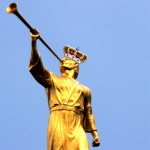Not too long ago, I wrote in the Salt Lake Tribune that I feel an affinity for the many folks who are revoking their LDS church memberships, these days, but that I am not planning to resign. In the same piece, I wrote, “I don’t think anyone should resign”.
I rather regret writing that notion in that way. In my zeal to come in under my word limit, I left out much of the nuance that really is necessary.
So, here’s my apology and my revision.
I would like to say that no one should resign. But I know better. As a middle-class, middle-aged, white, male, heterosexual, opposite-sex-married, rm, temple-recommend-holder from Utah, I am able to maneuver in the LDS church with great confidence and security. I realize that the institution’s policies are designed to protect and to privilege my demographic. When I declare that I am in favor of same-sex marriage, in and out of the church, and that I am opposed to policies of senseless, baldly un-Jesus-like exclusion, I know very well that I put little of myself at risk. Others whom the LDS church deliberately puts at disadvantage, or, worse, marginalizes, excludes, and, increasingly, persecutes, can be injured, substantially, by the church’s misbehavior, and may very well be much better off to put the LDS church behind them, for good.
For the record, I’m not opposed to ditching the LDS church.
Mostly, I’m in favor of not letting the Neo-Orthodox-Defenders-of-Their-LDS-Mormonist-Faith off the hook. The Defenders should also have to stake their own eternal souls on what they believe by acting on the principles they avow. If the Defenders will not countenance support for same-sex marriage, advocacy for the ordination of women, opposition to the patriarchal aggression of LDS temple rites, interest in the autonomy of ward communities (that is: freedom from Correlation), and so forth, let them commit their own selves, in Jesus’ eyes, to bringing down the spiritual guillotine on the heads of those who advocate doing things differently. If Defenders judge their brothers and sisters wrongly, then, they can suffer before the judgment bar with the rest of us.
But here’s the thing that is most important about making the Defenders do their own dirty work: any hesitation in any Defender to fire the spiritual bullet that kills constitutes a true, latter-day revelation.
A Defender who will not, gladly, eagerly, with a hymn on his lips, pull the trigger, or yank the cord, or throw the switch, or release the trap, or depress the plunger that consigns a neighbor to eternal, spiritual oblivion, gives the lie to his so dearly guarded faith. In fact, any hesitation reveals a Defender who is driven by the same rebellious impetus that drives Advocates.
After all, LDS policy—particular policy, we have learned, recently—is the revealed will of god. Only a rebel would hesitate or regret acting in accord with god’s will, even only momentarily. The Defender who would hesitate, though the sword be raised, would balk at carrying out what the church insists is god’s own design, and that delay is open rebellion, as sure as I am sitting in this chair. The Hesitating Defender reveals, unmistakably, his suspicion that revealed policy is wrong.
Advocates of a more inclusive church suspect nothing else.
Each hesitation to end someone else is a Jesus-like resistance to wrongness. Each hesitation reveals another member who questions, doubts, and instinctively resists demagoguery. Each hesitation to carry out revealed policy contributes, however minutely, to the expectation that the LDS church can, in spite of it all, climb out of the deep hole into which it has dug itself, to love the world, and to be—again, if it ever was—another joyful power in the world. Each hesitation reveals that Jesus is still here, after all.
There’s no denying that the LDS church causes great pain and sorrow. It has, over the past half-century, honed itself to pry families apart, to re-enforce stifling gender privilege, to sever ties of love and loyalty between blameless individuals, and to condemn innocence. Where the pain and sorrow the LDS church causes can inflict lasting, damaging harm, individuals should certainly secure themselves away from the institution.
And some of us should stay, for Christ’s sake. Those of us, especially, for whom the current form of the church exists, should sit in the privileged places the church gives us, and put a finger firmly on the earth as a witness. If not merely to affirm that we are not heretics in this tradition—which, as a matter of fact, we know at least as well as the many who would correct us—then to elicit that hesitation in others in which Jesus may yet be found.
___________________
Guillotine image from https://commons.wikimedia.org/wiki/Category:Guillotines_in_art#/media/File:Guillotine_(PSF).png













